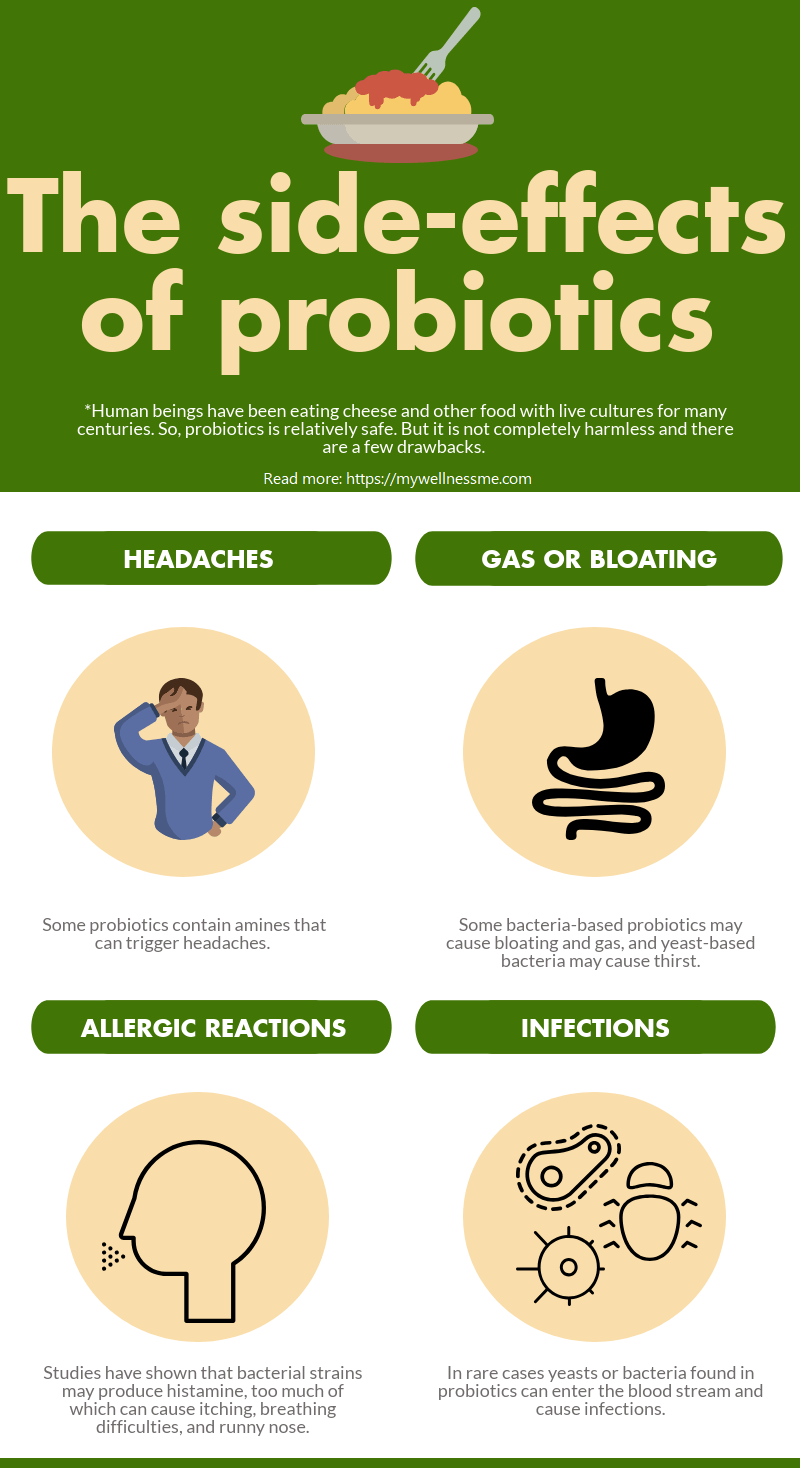The word “bacteria” does not evoke endearment but we all love our probiotics.
These live bacteria and yeasts have been all the rage in the food market for over a decade. They are good for our intestinal microbiota which is the trillions of bacterial cells that influence our gut health.
Yes, we have bacteria living in out guts, 500 different types of them. But, don’t cringe. Most of these species are actually quite helpful, keeping pathogens in check and making digestion easier.
The effectiveness of these bacteria depends a lot on the food we eat and lifestyle we keep. How are we doing on those counts? One theory is that we may have become too clean and too fussy for our own good. Diets that lack live cultures, the reliance on antibiotics, sanitation, all these could be negatively affecting our gut and stopping the microbiota from thriving.
This is where probiotics enter the picture.
Probiotics benefits
The following are some benefits of probiotics.

- Disturbance in the balance of bacteria in the gut results in digestive disorders. These disturbances are caused by stomach infections, damage in the lining of the intestines, and consumption of antibiotics. Probiotics restore gut balance in such cases.
- Research also shows that probiotics can improve the immune system. It’s like iron sharpening iron. The immune system needs a “workout” to become stronger or remain sharp. Probiotics can challenge the already-present bacteria in the immune system to react and become more resistant to diseases.
- Obesity too! Stress and fatty food can kill the beneficial bacteria and enable harmful bacteria to thrive, resulting in gas, bloated stomach and “leaky gut syndrome.” (Google the last one, it’s unpleasant.) Here, probiotics are the ideal SWAT team, fostering an ugly, acidic environment where harmful bacteria cannot thrive.
- Trials have revealed that lactobacillus GG, bacteria that is frequently used as a probiotic, can cure diarrhea in children and infants and also help to alleviate irritable bowel syndrome. Other probiotics can help to treat necrotising enterocolitis, a type of inflammation and infection of the kidneys seen in infants.
- Probiotics can aid mental health by maintaining a healthy gut which enables it to produce neurotransmitters such as serotonin and melatonin that are responsible for our moods and how the brain functions.
- They help to maintain the delicate balance of the gut’s ecosystem, which keeps harmful bacteria from multiplying out of control. An unhealthy gut could result in obesity or type 2 diabetes, high blood pressure and bad cholesterol, all of which can adversely affect the heart.
- Probiotics consisting of lactobacilli and bifidobacteria can bring down hay fever symptoms during allergy. You can also give probiotics a shot if you have eczema linked with cow’s milk allergy.
Probiotics for women’s health
Probiotics are good for vaginal health. Normally the lactobacilli bacteria ensure that harmful microorganisms do not survive in the vagina. But antibiotics and birth control pills can disrupt the delicate balance, which probiotics can restore. In fact, probiotics have benefits for women of all ages.
A study conducted by the Journal of Internal Medicine in 2018 revealed that they can aid to combat osteoporosis in older women.
Probiotics side-effects
Probiotics in foods is not a new thing. Human beings have been eating cheese and other food with live cultures for centuries.
So, they are relatively safe, with only a few possible drawbacks.

- Probiotic foods like yogurt and sauerkraut contain amines, substances formed due to the aging of protein-rich foods. Some may experience headaches after consuming such foods and should instead opt for supplements.
- Bacteria-based probiotics may lead to gas or bloating in some people and yeast-based probiotics can result in excessive thirst. You can counter these side-effects by starting with a low dose and then increasing the dosage over time, which gives the body time to adjust.
- Some bacterial strains found in supplements can produce histamine inside the gut, which is a molecule normally produced by your immune system to counter threats. Too much histamine can result in allergic reactions like itching, runny nose or breathing issues. Thus, people with histamine intolerance should avoid probiotics with these strains of bacteria.
- Probiotic supplements can contain allergens, such as soy, egg, lactose or prebiotic fibers. You should avoid them if you are allergic to these ingredients. Read the label before buying a supplement, just to be on the safe side.
- Sometimes, in very rare cases, the yeasts or bacteria in can enter the blood stream and cause infections. Those most vulnerable include people who have just had surgery, been in hospital for a long time, or have weak immune systems.
Also, note that the FDA does not regulate probiotics like medications, but food. Manufacturers therefore are not required to show whether their products are safe for work or not.
Which is better – supplements or foods?
Probiotics come in different forms and sizes – capsules, powders, tablets and foods. Experts believe that the form of the probiotics is irrelevant as long as your effective dose (which may vary) provides enough good bacteria to grow in the gut.
And it’s not that you can use one probiotic supplement for all ailments. There are some organisms that are effective for specific illnesses. The bacteria lactobacillus reuteri can help to treat infectious diarrhea in children. However, others, like lactobacillus acidophilus which are found in commercial yoghurts, are not effective against the condition.
Are all fermented foods probiotic?
No, they aren’t. When live cultures grow and metabolize, they ferment food. . (Read about how to ferment food and the many benefits these foods offer.) Some of these foods are consumed in their natural form, while others are processed before being passed off to eat.
The processing bit is the problem. It can kill off live cultures, greatly reducing health benefits. Even if these foods do have live microbes in them, they still can’t be classified as probiotics till they have been properly tested.
Probiotics are fermented foods that are proven to have health benefits when taken in specific dosages. As long as fermented foods meet that standard, they are probiotics.
Still a work in progress
Research in the field is not yet definite or complete and there is a possibility that, over time, we will get to know a whole lot more about these bacteria which could lead to treatments of many different health problems.
The destination may still be some time reaching as there are so many different types of probiotics to study.
What to look for on the label
Typically, probiotics bacteria are given three names; like, in lactobacillus acidophilus HM1, lactobacillus is the genus, acidophilus is the species, and HM1 the strain. So, if you are looking for lactobacillus acidophilus HM1 make sure all the names are there on the label or else it’s not the same product. The strain is particularly important as different strains have different health properties.
Also keep a close eye on the Colony Forming Unit or CFU.
CFU tells you the amount of bacteria in a dosage. Your doctor is the best person to tell you how much is enough. (Ideal dosage ranges from 100 million to more than 50 billion CFUs). Some supplements state CFU “at time of manufacture.” Avoid these at all costs as what should matter to you is the CFU at time of consumption.
And the CFU listed is the total sum of all probiotic strains in the product. If you find a supplement that lists the total for each type then nothing like it.
Prebiotics vs Probiotics
One seems like a typo of the other but they are not the same. Prebiotics are high-fiber food for the beneficial bacteria we carry in out guts; that is, they are food for probiotics.
Our gut health is at its best when we eat prebiotics along with probiotic-rich food. Some common prebiotic foods include bananas, chia seeds, flaxseed, garlic, oat, onions and Irish moss.
It also helps to have an active lifestyle. Here are some excellent tips to stay fit the eco-friendly way.
Prebiotics are available in supplements but it is recommended that you get them from natural foods like the ones mentioned above.
Probiotics foods you can add to your grocery list: Brine cured olives, cheddar, chocolate, fermented soy, fresh sour dill pickles, gouda and mozzarella cheese, kefir, kimchi, sauerkraut, traditional salami, yoghurt.
Probiotics are no panacea to all your health problems. In fact, you can be healthy without ever taking them. Still, they offer benefits to even people in good physical shape. Put in some research time before buying the product, so you know all the advantages you are getting with it.


4 comments
Awesome post about probiotics
Thanks!
Brilliant post! So informative and educational – thanks for sharing it!
You’re most welcome. 🙂
Comments are closed.